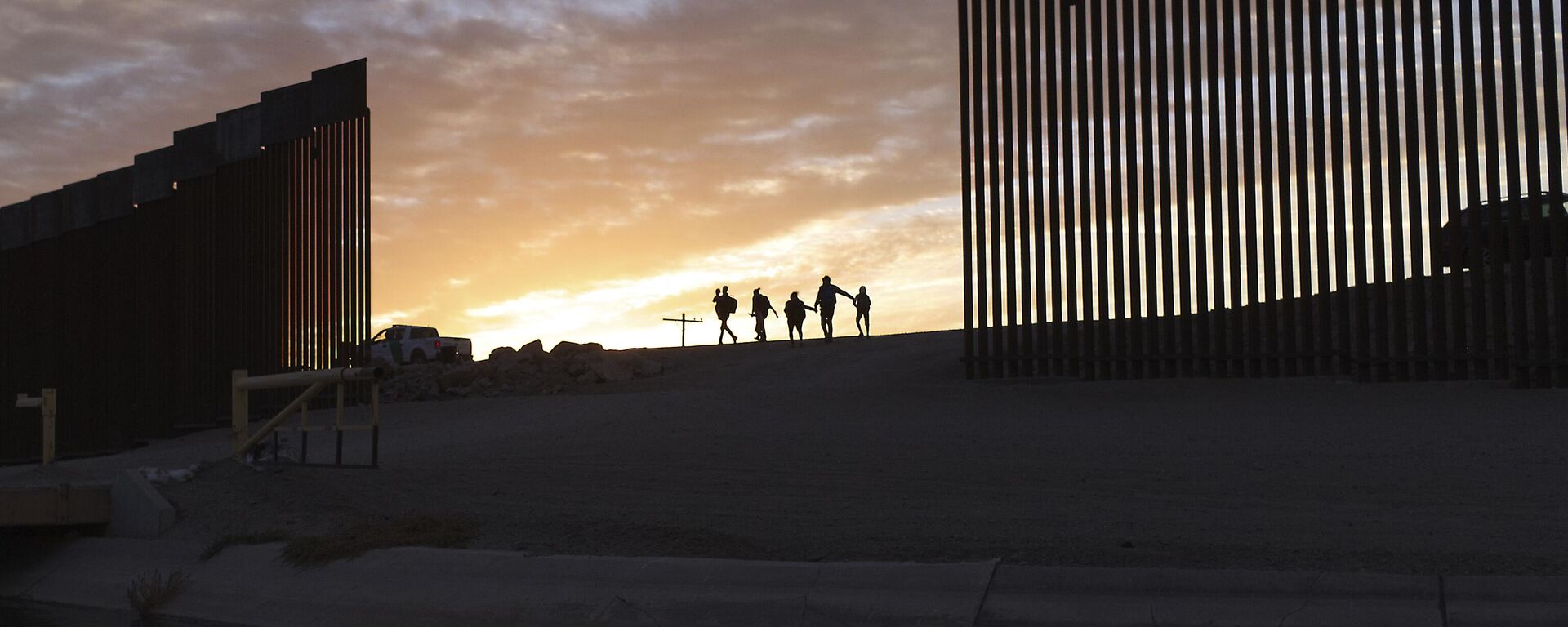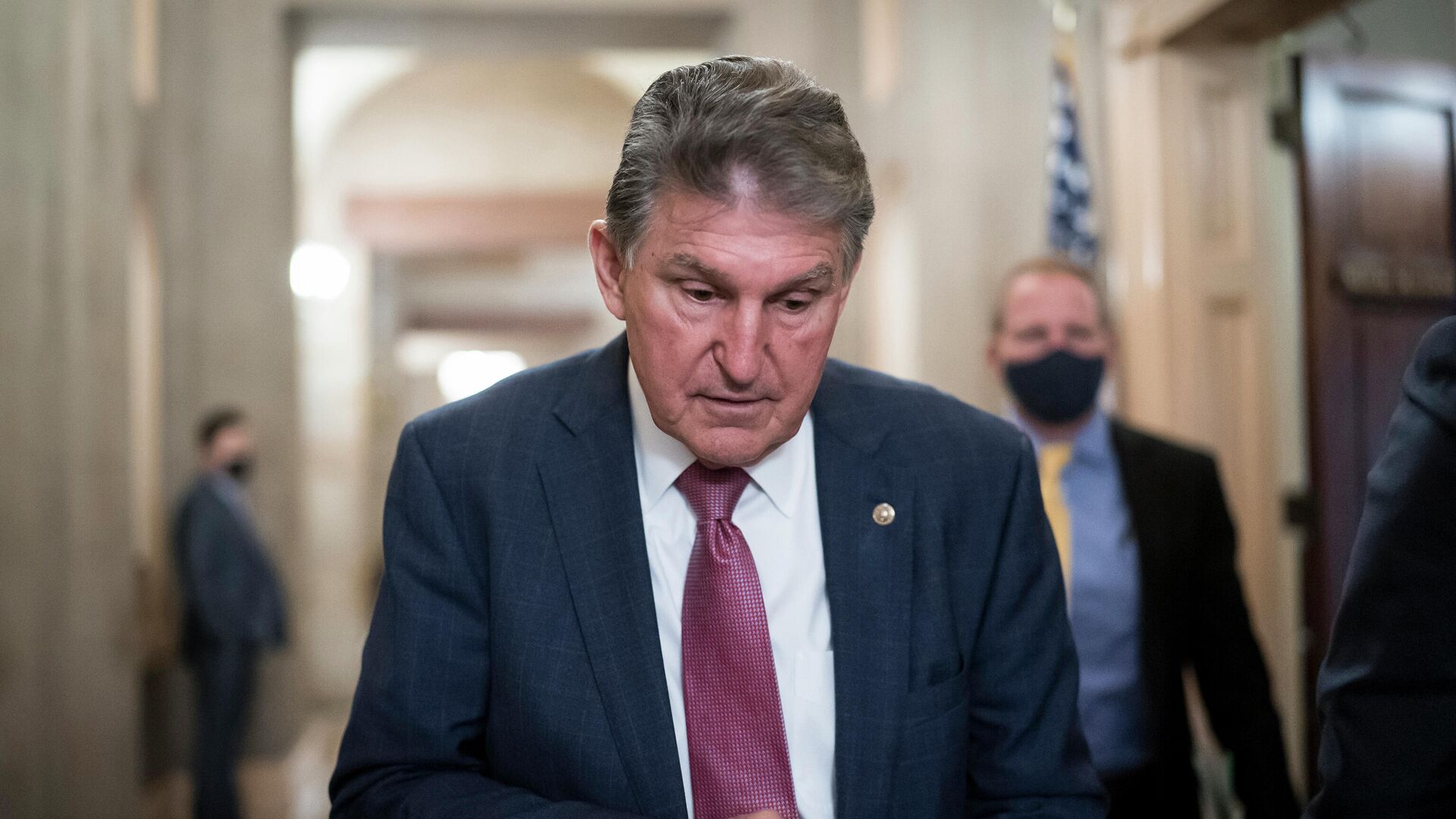https://sputnikglobe.com/20231218/senate-considering-limiting-humanitarian-parole-for-afghans-ukrainians---manchin-1115665210.html
Senate Considering Limiting Humanitarian Parole for Afghans, Ukrainians - Manchin
Senate Considering Limiting Humanitarian Parole for Afghans, Ukrainians - Manchin
Sputnik International
After months of furious debate, some federal lawmakers are suggesting a deal could soon be reached that would include both billions of dollars in aid for Ukraine and Israel, as well as new security protocols for the US border.
2023-12-18T18:40+0000
2023-12-18T18:40+0000
2023-12-18T18:40+0000
americas
sen. joe manchin (d-west virginia)
us
senate
immigration
border security
ukraine
afghanistan
https://cdn1.img.sputnikglobe.com/img/07e6/01/0a/1092142516_0:0:3072:1728_1920x0_80_0_0_23555ece7573794b61cf42b09207fc85.jpg
Speaking to the US press on Sunday, US Sen. Joe Manchin (D-WV) said the Senate was considering several additions to the bill, including stricter requirements for people who want to claim asylum, a new way to expel migrants more quickly, and limits on humanitarian parole.“It’s very, very dangerous,” Manchin said of the number of people being allowed to enter the US.He said it would give authorities more time to “adjudicate” the thousands of refugees “dispersed” throughout the country as well as to deal with “those who came for the wrong reason, or who came just because of the relaxed rules.”Humanitarian parole, also called humanitarian sponsorship, is a Department of Homeland Security program by which refugees from a select few countries can gain quick admission to the United States by way of an in-country sponsor who agrees to connect the refugee to housing, employment, and other resources once they arrive in the US.Some Republicans who have objected to the US sending further aid to Ukraine without some kind of accountability or benefit for Americans, have sought to tie further Ukraine aid to border security provisions. A bill that the House passed last month that separated aid for Israel, which is engaged in a slogging ground invasion of Gaza and low-intensity conflicts with several other militant groups in the region, from the rest of the aid bill. However, Senate Majority Leader Chuck Schumer (D-NY) declined to take up the legislation, seeking to tie Israel aid to Ukraine aid as well.Contrary to Manchin’s expectation that a deal would soon be reached, South Carolina Republican Senator Lindsey Graham told US media that same day that conservatives were “being jammed” in the negotiations.However, the White House has pressed lawmakers to vote before leaving for their end-of-year recess, as Ukraine aid is expected to “run out” by the end of the year. The House adjourned until January on Thursday, but the Senate has delayed in order to continue negotiations. Schumer told US media he intends to hold a vote this week.Paolo Raffone, a strategic analyst and director of the CIPI Foundation in Brussels, told Sputnik on Monday that the US had demonstrated it was “eminently not interested in the fate of the Afghans” after withdrawing from the country in 2021, ending a 20-year-long occupation war.“The EU has done nothing to set up a process to accept regular migration or protection procedures from Afghanistan. Also in the case of Ukraine, the US is not interested in receiving Ukrainian migrants. Ukrainians who fly from conscription and political persecution can only pour in EU countries. The responsibility for the outflow of Afghan and Ukrainian migrants rests with US/EU policies in these countries.”
https://sputnikglobe.com/20231215/arizona-deploys-national-guard-to-us-mexico-border-over-spike-in-illegal-border-crossings-1115614302.html
https://sputnikglobe.com/20231216/ukraine-on-brink-of-humanitarian-collapse-authorities-admit-1115617784.html
americas
ukraine
afghanistan
Sputnik International
feedback@sputniknews.com
+74956456601
MIA „Rossiya Segodnya“
2023
News
en_EN
Sputnik International
feedback@sputniknews.com
+74956456601
MIA „Rossiya Segodnya“
Sputnik International
feedback@sputniknews.com
+74956456601
MIA „Rossiya Segodnya“
will senate pass border bill, us border ukraine aid, joe manchin
will senate pass border bill, us border ukraine aid, joe manchin
Senate Considering Limiting Humanitarian Parole for Afghans, Ukrainians - Manchin
After months of furious debate, some federal lawmakers are suggesting a deal could soon be reached that would include both billions of dollars in aid for Ukraine, Israel, and Taiwan, as well as new security protocols for the US border. However, many still see a deal before 2024 as impossible.
Speaking to the US press on Sunday, US Sen. Joe Manchin (D-WV) said the Senate was considering several additions to the bill, including stricter requirements for people who want to claim asylum, a new way to expel migrants more quickly, and limits on humanitarian parole.
“It’s very, very dangerous,” Manchin said of the number of people being allowed to enter the US.
“You have to raise the threshold on the definition of asylum. You just can’t just say ‘someone threatened me, I’ve got to come into your country,’ you have to show and have proof that this type of threat to you and your family is basically untenable and you cannot live in those conditions. That’s going to change things,” Manchin said.
He said it would give authorities more time to “adjudicate” the thousands of refugees “dispersed” throughout the country as well as to deal with “those who came for the wrong reason, or who came just because of the relaxed rules.”

15 December 2023, 23:26 GMT
Humanitarian parole, also called
humanitarian sponsorship, is a Department of Homeland Security program by which refugees from a select few countries can gain quick admission to the United States by way of an in-country sponsor who agrees to connect the refugee to housing, employment, and other resources once they arrive in the US.
Manchin, who has long frustrated Democrats for his propensity to cross the aisle and side with Republicans, said that bipartisan compromise was the only way the White House’s bill would get through Congress.
Some Republicans who have objected to the US sending further aid to Ukraine without some kind of accountability or benefit for Americans, have sought to tie further Ukraine aid to border security provisions. A bill that
the House passed last month that separated aid for Israel, which is engaged in a slogging ground invasion of Gaza and low-intensity conflicts with several other militant groups in the region, from the rest of the aid bill. However, Senate Majority Leader Chuck Schumer (D-NY) declined to take up the legislation, seeking to tie Israel aid to Ukraine aid as well.
Contrary to Manchin’s expectation that a deal would soon be reached, South Carolina Republican Senator Lindsey Graham told US media that same day that conservatives were “being jammed” in the negotiations.
“We’re not anywhere close to a deal,” he said. “It’ll go into next year.”
However, the White House has pressed lawmakers to vote before leaving for their end-of-year recess, as Ukraine aid is expected to “run out” by the end of the year. The House
adjourned until January on Thursday, but the
Senate has delayed in order to continue negotiations. Schumer told US media he intends to hold a vote this week.

16 December 2023, 07:58 GMT
Paolo Raffone, a strategic analyst and director of the CIPI Foundation in Brussels, told Sputnik on Monday that the US had demonstrated it was “eminently not interested in the fate of the Afghans” after
withdrawing from the country in 2021, ending a 20-year-long occupation war.
“The US and NATO ran away from Afghanistan in a dishonorable manner,” he said. “Moreover, they abandoned many people who had collaborated with them over the past 20 years. Those people are running out of Afghanistan because the new regime considers them ‘traitors’ and their lives are at risk. The US is eminently not interested in the fate of the Afghans.”
“The EU has done nothing to set up a process to accept regular migration or protection procedures from Afghanistan. Also in the case of Ukraine, the US is not interested in receiving Ukrainian migrants. Ukrainians who fly from conscription and political persecution can only pour in EU countries. The responsibility for the outflow of Afghan and Ukrainian migrants rests with US/EU policies in these countries.”




